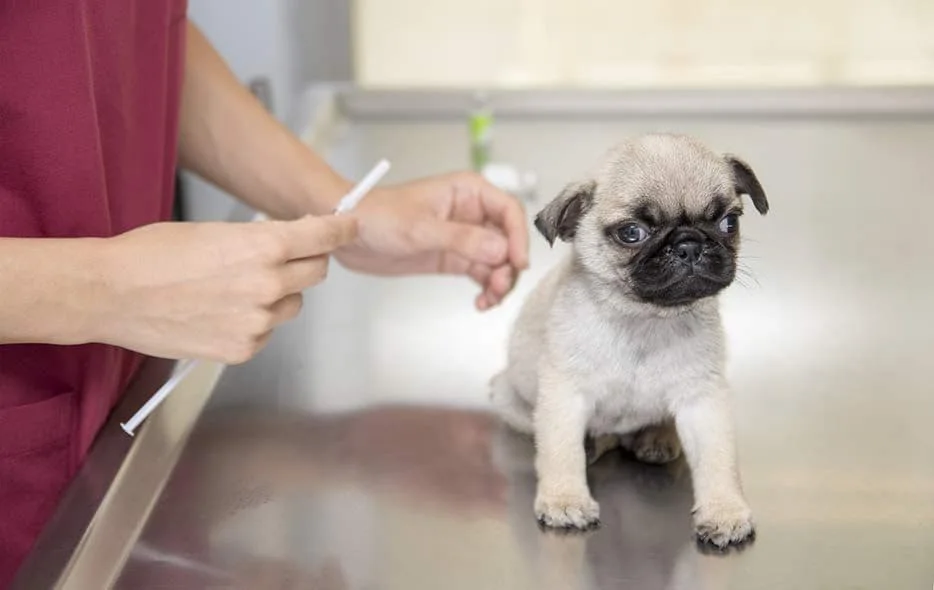Vaccinations for puppies in the Phoenix area are essential for the health and well-being of young dogs. Vaccinating puppies at an early age can prevent them from contracting numerous life-threatening illnesses and aid in the prevention of disease outbreaks in the future.
While the importance of vaccinations is well-known, many pet owners may not be aware of the specific protocols that should be followed to ensure their pet's health.
Puppy Shots
Protecting your pup with vaccinations is an important part of pet ownership. vaccinations are a series of immunizations designed to protect against common diseases, such as rabies, distemper, parvo, and bordetella. It's also important to follow up with annual boosters throughout your dog’s life to ensure their immunity is kept up-to-date. While there may be some minor side effects associated with vaccinations, these risks are far outweighed by the benefits of protecting your pup from serious illnesses and even death.
Benefits Of Vaccinations
Vaccinations provide protection from common illnesses and prevent the spread of infectious diseases like Parvovirus. Vaccinations for your pup reduce the risk of contracting other illnesses, such as kennel cough or Leptospirosis. By vaccinating your puppy, you can give them a better chance of staying healthy in the long term and help to protect other dogs in the community.
Risks From Not Vaccinating Your Puppy
Vaccinations are an important part of protecting your puppy’s health. By not vaccinating your puppy, you are leaving them open to a number of risks. Some illnesses your pup can contract, like parvovirus and distemper, are serious and potentially fatal. If your furry friend gets one of those, it can mean significant medical bills or hospitalization. Vaccinations are the best way to ensure your puppy stays healthy and safe, so be sure to keep up with the recommended schedule.
Vaccinations Available for Your Pup
Vaccines are an important part of keeping your pup healthy. Depending on your pet's lifestyle, there are several types of vaccinations available. These include core vaccines, such as rabies, distemper, and parvovirus, as well as other non-core vaccinations. Core vaccines are considered essential for every pup, while non-core may be recommended depending on the individual pet's needs and lifestyle. Speak to a vet about which types of vaccinations are best for your pup to ensure optimal health and wellness.
Core Vaccines - These are puppy shots that are recommended for all pets, such as rabies, distemper, parvovirus, etc. These vaccinations should ideally begin at 8 weeks of age, with a booster at 12 weeks. After that, puppies should get boosters every 1 to 3 years, depending on the type of vaccine. It's also important to discuss any additional (non-core) vaccinations that may be needed based on the puppy’s individual lifestyle and risk factors with your veterinarian.
Non-Core Vaccines - Non-core vaccines are not required for puppies but may be recommended depending on the individual pup's lifestyle. These vaccines protect against illnesses such as Bordetella, Leptospirosis, and Rattlesnake venom. While these may not be necessary for all puppies, they can protect against serious and potentially deadly illnesses that your pet may come into contact with. Talk to your veterinarian about which non-core one is right for your puppy and their lifestyle.
Scheduling Guidelines For Vaccinations
Scheduling vaccinations for your puppy is an important part of keeping them healthy. Puppies should receive a series of vaccinations starting at 6-8 weeks of age and then repeated every 3-4 weeks until 16 weeks of age. After that, a booster should be administered annually.
Frequently Asked Questions
Phoenix Veterinary Center receives questions daily about vaccinations. Here are a few of the most common:
Are vaccinations safe?
Vaccinations are generally considered to be safe and effective. Vaccines work by introducing tiny amounts of antigens into the body, which help to stimulate the immune system to build immunity against a particular disease. Vaccines are rigorously tested and monitored for safety, ensuring that any potential side effects are kept to a minimum. Vaccinations are essential for helping to protect your pet from dangerous illnesses, making them well worth considering for any new pet owner.
Are there any alternative vaccination schedules available for puppies?
Yes, there are various alternative puppy vaccination schedules available. These schedules typically involve fewer vaccinations and extended intervals between them. However, the American Veterinary Medical Association (AVMA) recommends that puppies receive core vaccinations on a regular schedule to ensure they are protected from common illnesses. Talk to us about which schedule might be best for your puppy and their lifestyle. Give us a call at (602) 559-5500 to find out more about vaccination schedules.
Are there any adverse reactions to vaccinations for my puppy that I should be aware of?
Depending on the type of vaccinations that are given, there is always a small chance that your pup could experience an adverse reaction. Common reactions may include mild fever or discomfort at the injection site. If you notice any of these symptoms, contact us immediately. More severe reactions, such as anaphylaxis and organ inflammation, can occur in rare cases. It's recommended to talk to a vet about all possible side effects before receiving any vaccinations for your puppy.
Are there any natural alternatives to traditional vaccinations?
It's important to note that natural vaccinations are not as reliable as traditional vaccinations and may not provide complete protection against certain illnesses. It's recommended that owners discuss any alternative choices with a vet before pursuing this option.
What diseases do vaccinations protect against?
Vaccinations for your furry friend protect against a variety of diseases, including:
Distemper - Distemper is a contagious virus that affects young puppies and can be prevented through vaccinations. It is highly recommended that puppies are vaccinated for distemper as soon as possible.
Parvovirus - Parvovirus is a contagious virus that can be fatal in puppies. Vaccination is the best way to protect your puppy from parvovirus and other serious illnesses.
Hepatitis - Hepatitis is a type of virus that can cause serious health complications in puppies and other pets. Vaccines are the best way to protect your pup from this virus and should be administered as part of their routine vaccinations.
Rabies - Rabies is a deadly virus that can be passed from animals to humans, so it’s essential to vaccinate your puppy for rabies. The vaccine works by stimulating the body’s immune system to recognize and respond to the rabies virus, and it provides protection against the virus for up to three years.
Adenovirus - Adenovirus is a contagious virus that can affect puppies. Vaccines are available to protect against this virus and should be administered as soon as possible after your puppy is born.
Leptospirosis - Leptospirosis is a bacterial disease that can be spread to puppies through contact with water or soil that has been contaminated by infected animals. Vaccination is the best way to protect your puppy from leptospirosis, as it provides long-term immunity.
Bordetella - Bordetella is a type of bacteria that can lead to kennel cough in puppies. This vaccine should be given at least two weeks prior to the puppy visiting any public places, such as a dog park or grooming salon, and then again every six months after that.
Lyme Disease - Lyme disease is a serious bacterial infection that is spread by ticks and can be fatal if left untreated. While it can be found in many different species of animals, puppies are particularly susceptible to the disease due to their immature immune systems.
Some symptoms of Lyme disease include:
- Fever
- Joint pain and swelling
- Fatigue
- Rash
- Loss of appetite
A veterinarian will be able to discuss the best vaccination schedule for your puppy based on their age and lifestyle. Taking these steps can help keep your puppy safe from this potentially dangerous illness.
Canine Influenza - Canine influenza, more commonly known as dog flu, is a highly contagious respiratory virus that can affect dogs of all ages. It is spread through contact with infected dogs and their respiratory secretions. Vaccines are available that can help protect your puppy from canine influenza. While the vaccine does not guarantee complete immunity, it does reduce the symptoms of the virus and offers the best protection against it. Puppies should be vaccinated for canine influenza at least twice during their first year of life in order to give them the best protection possible.
What age should puppies start receiving vaccinations?
Vaccinations are an important part of keeping your puppy healthy. Puppies should begin receiving vaccinations at around 6-8 weeks old and continue to receive vaccinations at regular intervals until they’re around 16 weeks old. Vaccines are typically given in a series of three or four doses and should be completed before the puppy is exposed to any potential sources of infection. It’s important to work with your veterinarian to develop a schedule that meets your puppy’s needs.
Can a dog survive rabies?
While there is currently no cure for rabies, dogs who have been vaccinated and who become exposed to the virus can receive post-exposure prophylaxis (PEP) to reduce their risk of developing the disease. In addition to vaccinations, it's important to keep your puppy’s environment as clean as possible and keep them away from wild animals. Taking these steps can help give your puppy the best chance of surviving rabies if they are ever exposed.
Is it safe to vaccinate a pregnant puppy?
Vaccinations are important for the health of both the mother and her unborn puppies, as it can help to protect them from potentially deadly illnesses. In most cases, vaccinations can be safely administered during any stage of pregnancy. However, in certain circumstances, it may be advised not to vaccinate a pregnant dog. They may also suggest postponing vaccinations until after she gives birth and her puppies are at least two weeks old.
Are there any age restrictions on when puppies can get vaccinated?
Vaccinations are critical for protecting a puppy's health and should not be skipped or delayed. It is also important to note that some vaccinations require multiple doses at different times, so it is essential to follow the instructions provided by your veterinarian.
Schedule Your Puppy's Shots Today
All puppies need their vaccinations to ensure they remain as healthy and happy as possible. At the Phoenix Veterinary Center, we offer comprehensive vaccination care in Phoenix, AZ, and the surrounding cities.
To schedule your puppy's shots with our senior pet care team, contact us today at (602) 559-5500 or send us a message online. A member of our team will answer your initial questions and help you book an appointment with one of our experienced and professional Phoenix veterinarians. If you are happy with the veterinary services we provide, then please do not hesitate to leave us a review or refer us to your friends. Call today!




